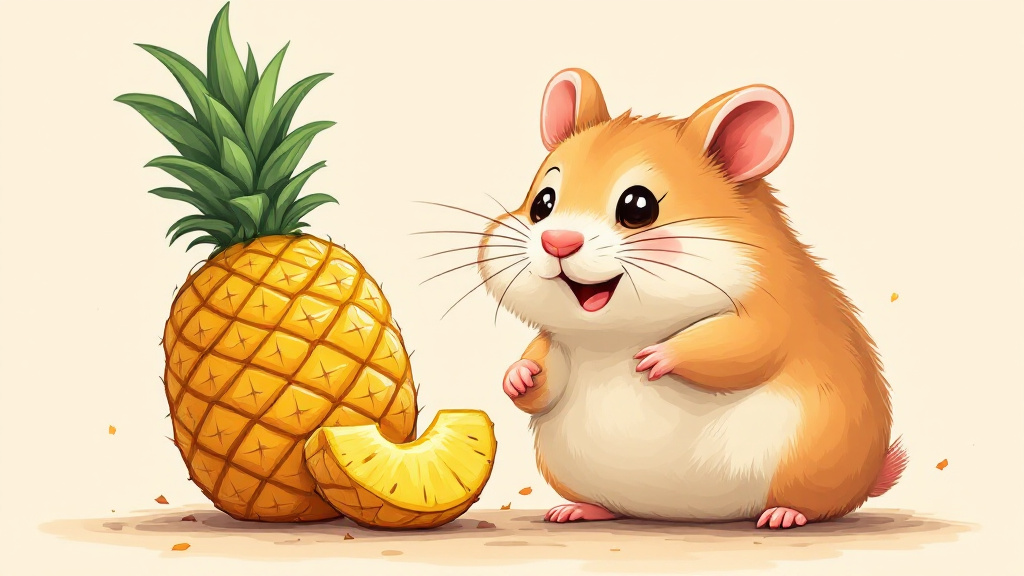Hamsters are known for enjoying a variety of fruits and vegetables, but when it comes to pineapple, many pet owners wonder: can hamsters eat pineapple? The answer is yes—hamsters can safely enjoy pineapple as an occasional treat, but moderation is essential. While pineapple is not toxic, its high sugar content and acidity mean that it should be offered in controlled portions to avoid health issues. In this blog, we will explore the nutritional benefits pineapple can provide for hamsters, as well as the potential risks and best practices for serving it.
Nutritional Benefits of Pineapple for Hamsters
- Vitamin C: Pineapple is a rich source of vitamin C, which can help support a hamster’s immune system, especially in times of stress or illness. While hamsters can synthesize their own vitamin C, extra intake during these periods may offer added benefits.
- Manganese: This essential mineral plays a key role in maintaining bone health and supporting the metabolism of proteins and carbohydrates. Including manganese-rich foods like pineapple in a hamster’s diet can contribute to their overall wellbeing.
- Dietary Fiber: The fiber content in pineapple helps maintain a healthy digestive system. Though hamsters primarily get fiber from their regular food, the small amount from pineapple can aid in digestion and prevent constipation when given in appropriate amounts.
- Hydration: Pineapple’s high water content makes it a hydrating snack, which can be especially beneficial during warmer months. However, due to its high sugar content, this benefit must be balanced by limiting the quantity served.
Potential Risks and Precautions
While pineapple offers several health benefits for hamsters, there are potential risks that need to be carefully managed:
- High Sugar Content: Pineapple contains natural sugars, which can lead to weight gain, obesity, and even diabetes if consumed in large amounts. Hamsters are prone to these conditions when their diet includes too many sugary foods. It’s important to limit pineapple to small portions to avoid these issues.
- Acidity: The acidity of pineapple can cause digestive upset in hamsters, leading to problems like diarrhea if they eat too much. Hamsters have sensitive digestive systems, and excessive acidic foods can easily throw their gut health out of balance.
- Digestive Issues: Pineapple’s fibrous texture can be tough for some hamsters to chew and digest. If a hamster struggles with the fibers, it could lead to discomfort or potential blockages, particularly if large pieces are given.
Recommended Serving Size
When feeding pineapple to your hamster, it’s crucial to keep portion sizes small:
- Safe Portion Size: Start with a piece about the size of a pea or a 1 cm cube. This ensures that your hamster can enjoy the fruit without the risk of overindulgence.
- Frequency: Limit the serving to once or twice a week. This will help your hamster enjoy the benefits without the risks of too much sugar or acidity.
- Introducing Pineapple: When introducing pineapple into your hamster’s diet, observe their behavior and digestion closely. Offer a tiny piece first and monitor for any adverse reactions such as loose stools or changes in behavior before continuing.
How to Serve Pineapple to Hamsters
To safely serve pineapple to your hamster:
- Preparation: Only offer the soft, fleshy part of the pineapple. The skin, leaves, and core should be avoided as they can be too tough to digest and may pose choking hazards.
- Texture and Size: Cut the pineapple into very small, bite-sized pieces to ensure your hamster can easily chew and swallow them. Make sure there are no sharp or hard edges that could injure your hamster’s delicate cheek pouches.
Conclusion
In conclusion, while hamsters can eat pineapple, it should be treated as an occasional snack rather than a regular part of their diet. Pineapple provides some valuable nutrients like vitamin C, manganese, and fiber, but it also carries risks due to its high sugar content and acidity. By serving small, manageable portions and monitoring your hamster’s reaction, you can offer this tropical treat safely. As always, a balanced diet of commercial hamster food, alongside safe fruits and vegetables, is key to keeping your hamster healthy and happy.

